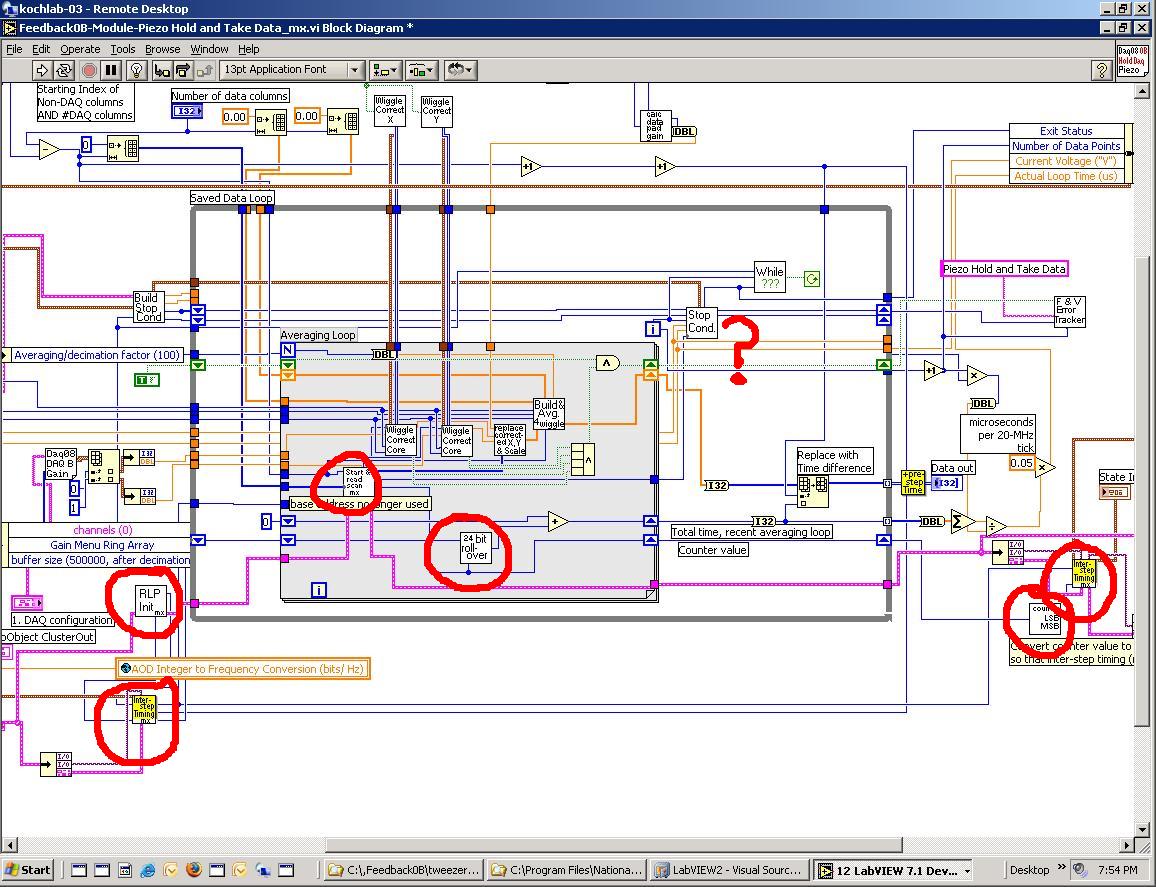User:Steven J. Koch/Notebook/Kochlab/2009/03/04/Continued feedback tweaking
|
Note: This page was transferred from the private wiki, and thus links and images may be broken until they are fixed. |
/Need to replace RLP_GetBitResolution VI
Going to start replacing RLP stuff in core VI
Steven J. Koch 19:53, 4 March 2009 (EST): Replacing timing stuff is now easy. I'm having trouble with the data points, though, because those were in integer format, whereas DAQmx likes to use scaled values (double precision voltages). There are two options:
- Try to figure out how to use the RAW formats, which looks tricky (there aren't as many options for N channels 1 sample, etc.)
- Try to scale the double precision values back to integers. This will require knowing the gains, though, which probably isn't too terrible; not sure yet.
- Steven J. Koch 19:58, 4 March 2009 (EST): There is an "unscaled" option, and this reliably crashes LabVIEW 7.1 when I try it (though I may not have set up the task correctly)

- Steven J. Koch 20:12, 4 March 2009 (EST): Not sure what I did differently, but it's not crashing anymore. I can use any of the unscaled options, with 1 datapoint setting, and it's not crashing.
- I created a testing VI "Uscaled timing testing.vi" and found this:
- Without the DAQ enabled, the MEDIAN (not mean) loop time was about 33 microseconds.
- With the DAQ enabled (4 channels) the loop time was about 66 microseconds. So, that's an extra 8 microseconds per DAQ channel, not so bad, probably livable. We should be able to keep everything under 100 microseconds total, which should be good enough. (The mean was just slightly higher, like 3% 34 microseconds or 68 microseconds))
- Steven J. Koch 20:27, 4 March 2009 (EST): I am not sure how to read the data properly, in order to get the same kinds of integers we were previously.
/Need to figure out what to do with interstep timing
Steven J. Koch 21:22, 4 March 2009 (EST): I think I eliminated the RLP stuff from Interstep Timing. However, since it's built for 16-bit stuff, I need to make sure that I give it the correct values inside "Piezo Hold and Take Data" (AND THE OTHER MODULES) It is very likely that I'm going to screw this up.
Replacing RLP Init
Steven J. Koch 21:29, 4 March 2009 (EST):Renaming to "Initial RLP Commands_mx". I am going to send out the LSB 16 bits of the counter for now.
OK, I think I have made most of the changes in PHTD
Steven J. Koch 22:00, 4 March 2009 (EST):As shown below, I have circled the VIs I changed. I also had to add a new cluster to the connector pain on Piezo Hold and Take Data (two tasks + error cluster). I probably will have to modify the stop condition to get rid of AOD-specific stuff. Also, I will probably have to add a DIO task to that special cluster. Yeah, I'd better think about that now. There are opportunities in the "Build and Avg. 4 wiggle" to switch from MHz to microns. I don't think we really have to worry about that now, and it's a bit distracting now. It will require making the calibration file correctly when the time comes.
